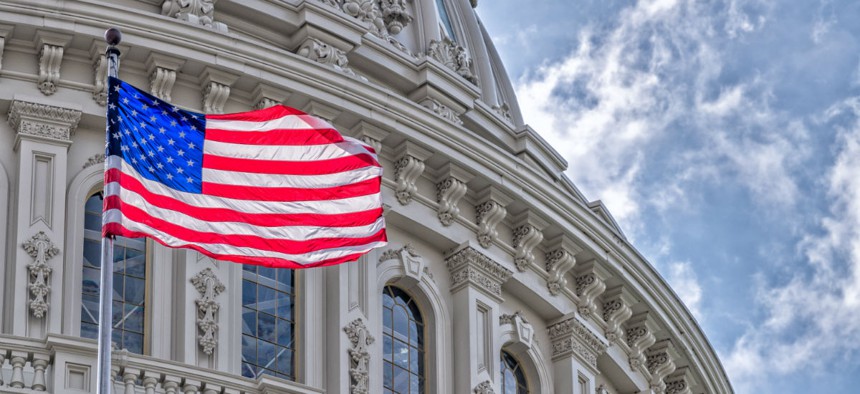
By Andrea Izzotti / Shutterstock.com
House Pushes Forward on Spending Packages That Would Boost Hiring, Block Trump-Backed Reforms
Lawmakers are still negotiating with the White House on overall spending caps.
The House this week moved closer to passing a sweeping collection of appropriations bills to fund federal agencies in fiscal 2020, the first such packages to set spending levels past September and measures that include an array of provisions affecting the federal workforce.
The first “minibus” bill would set line-by-line appropriations for the departments of Labor, Health and Human Services, Defense, State and Energy, as well as an array of other agencies and the legislative branch. Lawmakers have yet to reach an agreement to set overall spending levels by raising budget caps, something both parties are negotiating in consultation with the White House. Absent such an agreement, which is expected to include an increase to the nation’s borrowing limit, both defense and non-defense agencies would face a drastic cut of $125 billion combined.
The bill received resistance from Republicans, as it reflected Democratic priorities. The House is expected to pass the spending measure this week. While it is likely to change after top-line spending levels are set and before receiving the support of a Republican-controlled Senate, the measure in its current form contains several provisions to boost hiring across federal agencies.
State, for example, would be forced to hire up to its fiscal 2016 staffing levels. The department operated under a hiring freeze for more than a year after President Trump took office and has been struggling to backfill positions since Secretary Mike Pompeo lifted the freeze.
At Labor, the Wage and Hour Division would receive 500 new investigators to “reverse years of flat funding” that has “eroded and reduced investigative capacity,” Democrats said. The Occupational Safety and Health Administration would have to submit quarterly hiring and vacancy reports to Congress. The Appropriations Committee noted that OSHA investigative staff has diminished, leaving the agency capable of inspecting all of the entities under its purview once every 165 years.
The National Labor Relations Board’s staff has declined by 17% over the last two years, Democrats said. Their bill would fund 300 field staff hires. The Social Security Administration would receive $300 million to boost its field office hiring and reverse the agency’s efforts over the last several years to reduce its field office footprint.
House Democrats also said they were “deeply concerned” about a Trump executive order to remove administrative law judges from the civil service. Their bill would require agencies that use ALJs to submit a plan to Congress that ensures a fair hiring process for the judges.
The House adopted an amendment on a bipartisan basis to prevent the Trump administration from altering or terminating the agreement between the departments of Labor and Agriculture that governs the Job Corps Civilian Conservation Centers, as well as prevent the closure of any of the existing centers. USDA announced last month it would cut 1,100 jobs as it transferred the program to Labor, though the plans appeared to be stalled due to bipartisan pushback.
Congressional Democrats said they have faced difficulties in negotiating a budget deal with the White House, accusing the administration of delaying progress to maximize its leverage. Trump has threatened to veto Democrats’ spending package, calling it full of unnecessary spending at domestic agencies. Democrats are intent on ensuring a near equal increase in the spending caps for defense and non-defense agencies, a goal the White House rejects despite acquiescing to the demand in a two-year budget deal Trump signed in 2017.
Congressional leaders and the White House are slated to resume negotiations for a spending caps deal this week, with the administration tapping Treasury Secretary Steve Mnuchin to head up the talks. The administration and congressional Republicans have yet to agree on their strategy going forward.
House Democrats have also rejected any funding for a wall along the U.S.-Mexico border and any additional Border Patrol or Immigration and Customs Enforcement agents, a key priority for Trump. The same disagreement led to a 35-day shutdown that began late last year.
The White House’s request for emergency supplemental funding for the current fiscal year to address the influx of migrants at the southern border is also complicating negotiations. The administration asked for $4.5 billion, $3.3 billion of which it said would go toward humanitarian aid. Congressional Democrats have largely acknowledged a need for a spending influx, but are holding out support for the bill in hopes of ensuring the money goes only toward humanitarian efforts and not larger immigration enforcement efforts.
In the meantime, the House is moving forward with a second minibus package that would provide fiscal 2020 funding for the departments of Commerce, Justice, Agriculture, Interior, Veterans Affairs, Transportation and Housing and Urban Development, as well as the Environmental Protection Agency, NASA and other agencies. All told, the bill would provide $383.3 billion in discretionary appropriations to the covered agencies.
The bill contains funding for hiring surges at the Census Bureau, immigration judges and support staff at Justice, U.S. attorneys, Bureau of Prisons staff and Equal Employment Opportunity Commission investigators. It would provide $25 million each to USDA’s Rural Development office for increased staffing and to VA for hiring and overtime pay for benefits processing, while also boosting spending for the department’s mental health staff.
The measure would stymie efforts by the Interior Department to reorganize and attempts by the Environmental Protection Agency to slash employees. Lawmakers have provided some funding for Interior’s efforts, but have grown frustrated by what they see as a lack of transparency and insight into planning. Fiscal 2020 would mark the third consecutive year Congress has blocked EPA from moving forward with separation incentives such as buyouts and early retirement offers.
The House is set to begin consideration of the second spending package on Wednesday. House Republicans have slowed progress on the appropriations bills to a crawl by demanding a roll call vote on each amendment, of which there are hundreds.







